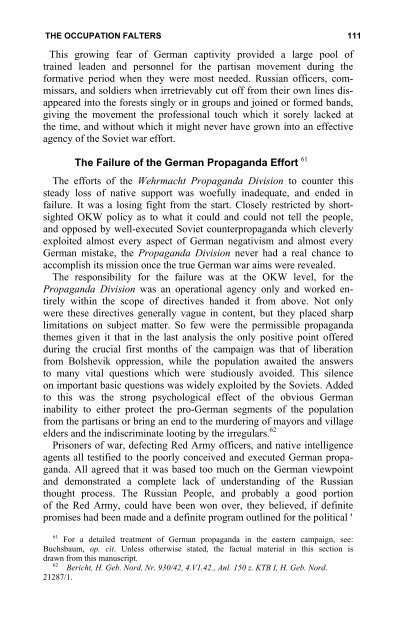the soviet partisan movement 1941-1944 by edgar m. howell
the soviet partisan movement 1941-1944 by edgar m. howell
the soviet partisan movement 1941-1944 by edgar m. howell
Create successful ePaper yourself
Turn your PDF publications into a flip-book with our unique Google optimized e-Paper software.
THE OCCUPATION FALTERS 111<br />
This growing fear of German captivity provided a large pool of<br />
trained leaden and personnel for <strong>the</strong> <strong>partisan</strong> <strong>movement</strong> during <strong>the</strong><br />
formative period when <strong>the</strong>y were most needed. Russian officers, commissars,<br />
and soldiers when irretrievably cut off from <strong>the</strong>ir own lines disappeared<br />
into <strong>the</strong> forests singly or in groups and joined or formed bands,<br />
giving <strong>the</strong> <strong>movement</strong> <strong>the</strong> professional touch which it sorely lacked at<br />
<strong>the</strong> time, and without which it might never have grown into an effective<br />
agency of <strong>the</strong> Soviet war effort.<br />
The Failure of <strong>the</strong> German Propaganda Effort 61<br />
The efforts of <strong>the</strong> Wehrmacht Propaganda Division to counter this<br />
steady loss of native support was woefully inadequate, and ended in<br />
failure. It was a losing fight from <strong>the</strong> start. Closely restricted <strong>by</strong> shortsighted<br />
OKW policy as to what it could and could not tell <strong>the</strong> people,<br />
and opposed <strong>by</strong> well-executed Soviet counterpropaganda which cleverly<br />
exploited almost every aspect of German negativism and almost every<br />
German mistake, <strong>the</strong> Propaganda Division never had a real chance to<br />
accomplish its mission once <strong>the</strong> true German war aims were revealed.<br />
The responsibility for <strong>the</strong> failure was at <strong>the</strong> OKW level, for <strong>the</strong><br />
Propaganda Division was an operational agency only and worked entirely<br />
within <strong>the</strong> scope of directives handed it from above. Not only<br />
were <strong>the</strong>se directives generally vague in content, but <strong>the</strong>y placed sharp<br />
limitations on subject matter. So few were <strong>the</strong> permissible propaganda<br />
<strong>the</strong>mes given it that in <strong>the</strong> last analysis <strong>the</strong> only positive point offered<br />
during <strong>the</strong> crucial first months of <strong>the</strong> campaign was that of liberation<br />
from Bolshevik oppression, while <strong>the</strong> population awaited <strong>the</strong> answers<br />
to many vital questions which were studiously avoided. This silence<br />
on important basic questions was widely exploited <strong>by</strong> <strong>the</strong> Soviets. Added<br />
to this was <strong>the</strong> strong psychological effect of <strong>the</strong> obvious German<br />
inability to ei<strong>the</strong>r protect <strong>the</strong> pro-German segments of <strong>the</strong> population<br />
from <strong>the</strong> <strong>partisan</strong>s or bring an end to <strong>the</strong> murdering of mayors and village<br />
elders and <strong>the</strong> indiscriminate looting <strong>by</strong> <strong>the</strong> irregulars. 62<br />
Prisoners of war, defecting Red Army officers, and native intelligence<br />
agents all testified to <strong>the</strong> poorly conceived and executed German propaganda.<br />
All agreed that it was based too much on <strong>the</strong> German viewpoint<br />
and demonstrated a complete lack of understanding of <strong>the</strong> Russian<br />
thought process. The Russian People, and probably a good portion<br />
of <strong>the</strong> Red Army, could have been won over, <strong>the</strong>y believed, if definite<br />
promises had been made and a definite program outlined for <strong>the</strong> political '<br />
61 For a detailed treatment of German propaganda in <strong>the</strong> eastern campaign, see:<br />
Buchsbaum, op. cit. Unless o<strong>the</strong>rwise stated, <strong>the</strong> factual material in this section is<br />
drawn from this manuscript.<br />
62<br />
Bericht, H. Geb. Nord, Nr. 930/42, 4.V1.42., Anl. 150 z. KTB I, H. Geb. Nord.<br />
21287/1.
















